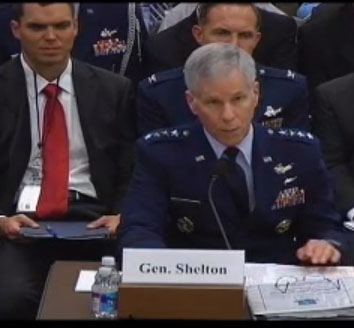
Four leading lawmakers, apparently impatient with the Obama Administration’s less-than-urgent approach to assuring availability of critical navigation and timing resources, have sponsored a bill mandating the Department of Defense institute a backup for the Global Positioning System.
If approved, the National Positioning, Navigation, and Timing Resilience and Security Act of 2015 (H.R. 1678) would give the U.S. secretary of defense three years to establish, an alternative, land-based source for positioning, navigation, and timing (PNT) data.
Four leading lawmakers, apparently impatient with the Obama Administration’s less-than-urgent approach to assuring availability of critical navigation and timing resources, have sponsored a bill mandating the Department of Defense institute a backup for the Global Positioning System.
If approved, the National Positioning, Navigation, and Timing Resilience and Security Act of 2015 (H.R. 1678) would give the U.S. secretary of defense three years to establish, an alternative, land-based source for positioning, navigation, and timing (PNT) data.
“We are very happy to see Congress becoming interested in this critical national and homeland security problem that Dr. Brad Parkinson has called ‘a single point of failure for much of America,’” said Dana Goward, president and executive director of the Resilient Navigation & Timing Foundation.
Goward’s foundation has been pushing for the revival of plans for the enhanced Loran (eLoran) system, a program that would update and use the infrastructure of the old Loran-C system to broadcast a powerful PNT signal on a frequency completely separate from that of GPS. Parkinson, a former Air Force colonel who managed construction of the first GPS system, now leads the National Space-Based Positioning, Navigation, and Timing (PNT) Advisory Board. The board, which comprises the nation’s leading satellite navigation experts, has come out strongly in favor of eLoran.
The bill, however, does not actually mandate what form the backup must take, although it does require that the new system be wireless, wide-area, and provide a precise, high-power 100-kilohertz signal. That signal should be “resilient and extremely difficult to disrupt or degrade” and able to penetrate underground and inside buildings, the bill says — which pretty much describes the capabilities of eLoran. The final version of this new system must also “take full advantage of the existing Loran infrastructure” and work in concert with, and complement, any other similar positioning, navigation, and timing systems, including eLoran.
Crossing the Aisle
The bipartisan quartet is particularly well placed to push their bill through the House and bring to heel any agency that fails to fulfill its prescribed roll. Three of the four lawmakers are on the House Armed Services Committee and Rep. Frank LoBiondo, a New Jersey Republican, is next in line for the chairmanship of the Tactical Air and Land Forces subcommittee.
All four are on the House Transportation and Infrastructure Committee where all four are either subcommittee chairman or ranking members.
LoBiondo and the other Republican co-sponsor, Rep. Duncan Hunter of California, chair the Subcommittee on Aviation and the Subcommittee on Coast Guard and Maritime Transportation respectively.
The bill’s sponsor, Rep. John Garamendi, D-California, and co-sponsor Rep. Peter DeFazio, D-Oregon, are, respectfully, their party’s most senior lawmakers on the Coast Guard and Maritime Transportation subcommittee and the Subcommittee on Highways and Transit.
Altogether the four representatives are in positions where they can make life miserable for the primary agencies dealing with navigation and eLoran if they don’t tow the line. These agencies — the departments of defense and transportation, whose deputy secretaries co-chair the National Executive Committee for Space-Based Positioning, Navigation, and Timing (PNT ExCom) and the Coast Guard, which is the current steward for the old Loran-C sites and a part of the Department of Homeland Security — are instructed in the bill to work together to bring the backup to fruition.
The bill also makes the leadership decision that no one in the Executive Branch appeared willing to tackle. It assigns DoD the job of sustaining and managing the new backup.
The question of which agency would take on management of a backup system has been the key sticking point for the last several years. The PNT ExCom asked the agencies to study backups for GPS, but a recommendation has been hung up over funding issues. No agency wanted to be responsible for the system and risk a potential hit to their budget.
The analysis effort had devolved into “rock management,” suggested one expert following the issue, with the Office of Management (OMB) asking for more detailed information on costs. OMB was the agency that canceled the already-approved eLoran program during the early days of the Obama administration.
They’re saying “give me a different rock,” quipped the expert, who would only discuss the ongoing study on condition of anonymity. “I don’t know what rock I want, but this isn’t the one I want — so, give me a different one.”
Goward said his organization was happy to see the apparently renewed interest from the executive branch in eLoran.
“The last time this issues was addressed by the executive branch alone it took four years from a presidential directive until a decision was made on a course of action, and then it was never executed,” Goward told Inside GNSS. “Perhaps with the Congress and Administration working together we will have a speedier resolution, and the results will actually be implemented. With every passing day America is more at risk so speed and effectiveness are essential.”





